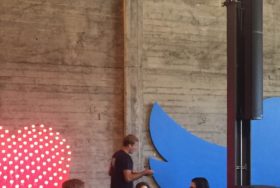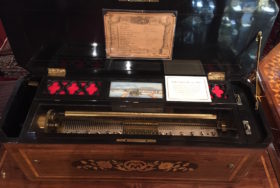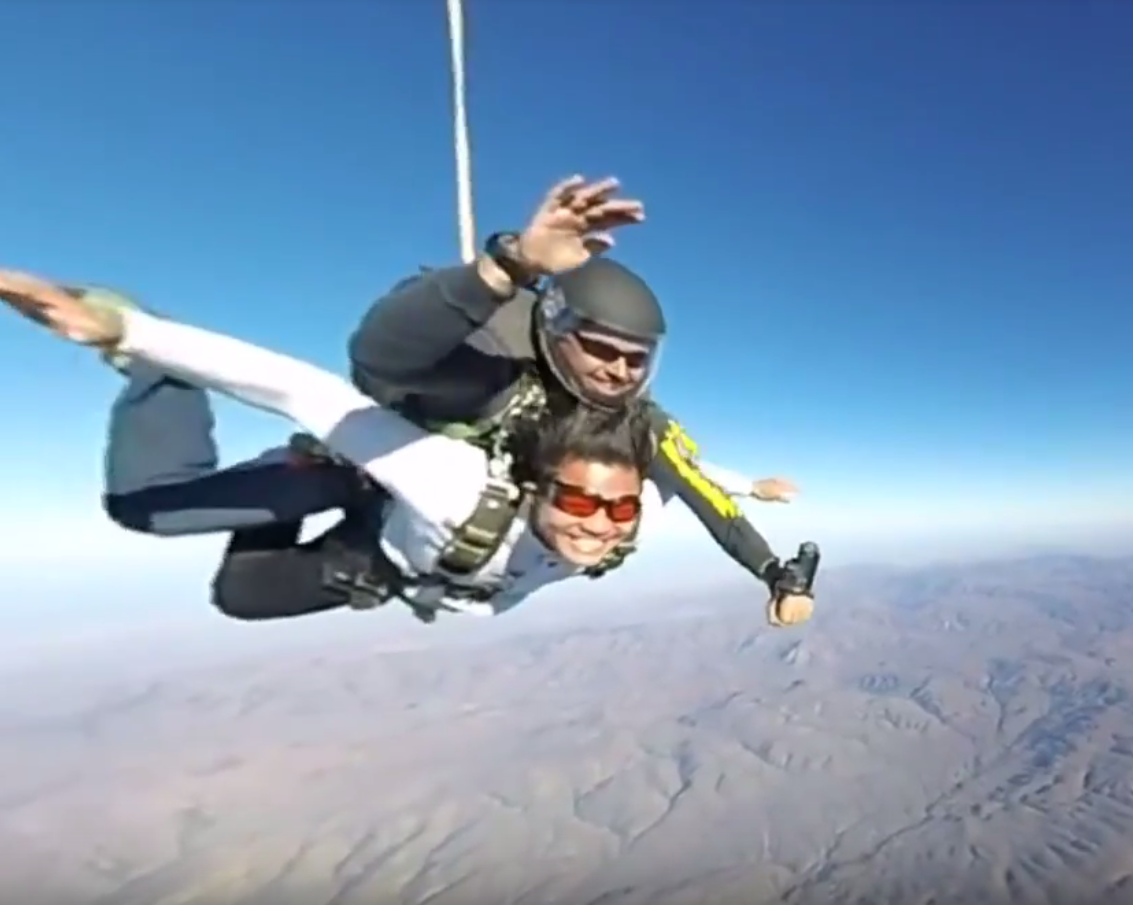
Combine the drive of an immigrant, the brains of an electrical engineer, and the empathy of a traveler, and what do you get? The story of one young man’s Silicon Valley startup dream.
The odds were stacked against Han Jin. His parents divorced when he was a toddler, and to make a new life, Zhao was forced to leave her one-year-old with her parents in Beijing while she taught traditional Chinese medicine in Germany. Han joined his mother in Hamburg at the age of six. Surrounded by “tall and blond” Germans in a city with few Asians, the only child struggled. “I didn’t speak the language, I didn’t know the people,” he recalled. “I had to adapt.” 如果您想看中文版本,请跳到最底页–本文由来自上海的王豪盛翻译.
Han worked hard, gravitating toward electrical and mechanical engineering at the Karlsruhe Institute of Technology. Catching “the fever of travelling,” he studied a year in Sweden, exploring France, Belgium, the Czech Republic, India, and his native China during summers. A masters degree from UC Berkeley seemed beyond reach, but he applied, was accepted, moved to California alone, graduated, and “built my life here.”
His career seemed set when he quickly landed a position in Silicon Valley as a program manager. The work wasn’t exciting, but “exactly what Asian parents would want.” Han valued the job security. “Being an immigrant, it was a huge struggle. You have to have a sponsor to pay for the H1B visa.” A green card seemed out of the question. He was told it would take ten years.
In his first month, Han explored how to improve traditional methods that he and his colleagues used to forecast demand. Han taught himself to code. Three months later, he’d built a forecasting model more accurate than human methods. But Han was not promoted, and while he appreciated the value of a good engineering job in Silicon Valley, he could feel his dreams of launching a startup slowly being “washed away.”
Inspiration came from two influences: an immigrant entrepreneur with a good cause, and a Stanford PhD with a tantalizing prototype. In April of 2014, Paul Duan, a French-Asian entrepreneur, called on Han for help with Bayes Impact, a data science startup tackling big social problems. “Paul was only 18. He really inspired me. He got into Y Combinator, raised money and scaled the company,” said Han. “I was part of the initial founding team.”
Taking the leap
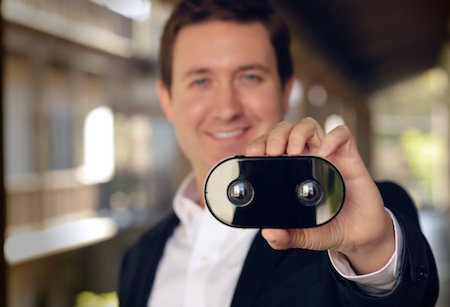 Emboldened by Duan, thrilled by his first taste of a startup, in February of 2015, Han applied for a coveted O-1 Visa, the type the US government grants to individuals who possess “extraordinary ability in the sciences, arts, education, business, or athletics.” The very next month he spotted something “super cool.” Adam Rowell, a talented engineer with a PhD in electrical engineering from Stanford, showed him a working prototype of a 3D camera with consumer potential. Travel had opened new horizons for Han, and the camera gave him a vision of how you might “stream yourself into a different country” and see through the eyes of the less privileged, to gain empathy, insights and understanding. The timing was uncanny. Soon after Han was granted his O-1 visa, and gave notice at his job. In June of 2015, he incorporated Lucid VR – with himself as CEO and Rowell as Chief Technology Officer. Almost immediately, he wondered if he’d make a huge mistake.
Emboldened by Duan, thrilled by his first taste of a startup, in February of 2015, Han applied for a coveted O-1 Visa, the type the US government grants to individuals who possess “extraordinary ability in the sciences, arts, education, business, or athletics.” The very next month he spotted something “super cool.” Adam Rowell, a talented engineer with a PhD in electrical engineering from Stanford, showed him a working prototype of a 3D camera with consumer potential. Travel had opened new horizons for Han, and the camera gave him a vision of how you might “stream yourself into a different country” and see through the eyes of the less privileged, to gain empathy, insights and understanding. The timing was uncanny. Soon after Han was granted his O-1 visa, and gave notice at his job. In June of 2015, he incorporated Lucid VR – with himself as CEO and Rowell as Chief Technology Officer. Almost immediately, he wondered if he’d make a huge mistake.
“No, I didn’t think it through,” Han said of the magnitude of jumping straight into a startup. “It felt like skydiving without a parachute.” Attracting funding was far more difficult than the young CEO had imagined. Though Lucid VR had initially attracted $70,000 in angel funding, larger investments had yet to materialize. A modest lifeline came when the team was granted free space at Lab360 Hardware Incubator, a Chinese-backed accelerator in Santa Clara, that has incubated some impressive startups, such as Arioliving. In the fall of 2015, running short of funds, they spun the Indiegogo crowdfunding wheel. “The first three days were slow,” recalled Han. He knew that projects that stumble out of the gate rarely fly on Indiegogo. “Why did I quit my job?” Han remembered thinking. “Why am I doing this? I gave up everything.”
Han told his small staff that “Now is the time to prove you are exceptional.” They changed their Indiegogo page dozens of times a day to see what stuck. And then, Han took a leap – literally. He drove south to Hollister, climbed into a small plane that flew to an altitude of 15,000 feet, and jumped. Another skydiver, wearing a LucidCam prototype, captured his dive in 3D, an adventure featured on their Indiegogo page. That was day ten of the campaign. “We turned it around,” said Han. “We passed our goal in 25 days and got $115,000.”
Han then boldly took another leap into the unknown, jetting alone to Taiwan a few weeks later. “Wow, it worked,” he remembered thinking of the Indiegogo success. “Now we’ve got to build it.” Somehow he landed meetings in Taiwan, and pitched the island’s top five original design manufacturers. Wistron signed on, agreeing to invest $1 million, and in late March, Lucid VR announced it had raised a total of $2.1 million from Wistron, S2 Capital, Lab360, TEEC Angel Fund, and 17 Miles Technology, as well as a couple of angels.
Lean Startup Meets 3D
LucidCam stereoscopic 3D cameras are set to ship in June, the first 500 slated for Indiegogo supporters, and the rest to the general public, at $499. Han is betting they can carve out a niche by taking a lean startup approach to ease-of-use, portability, and price.
While the industry standard is 360-degree panoramic, Lucid has opted for the less cumbersome 180-degree format. “Why hasn’t 360 taken off?” asked Han. “It makes the hardware experience bulky and big. It’s difficult to scale. File sizes are huge.” Emphasizing the difficulty of downloading and processing 360 files, he added, “With 180, it’s smaller hardware, more scalable, more compact to get into hands.”
Portability is key with this handheld or body-mounted camera. The 32GB of storage (expandable to 64GB) provides the ability to shoot for 10 hours (4k images and 4k video). Clip your mobile phone to the back of the LucidCam, and you can see what you’re filming. A $30 VR flip case accessory doubles as a viewer. Files are streamed in real time to your phone, and edited through Adobe Creative Suite. “We wanted to keep it simple,” said Han, who said early adopters will be indie movie directors, producers and content creators. Then, “if the content is good, we’ll attract general consumers.”
Of course, other big players could jump into the market. GoPro, for one, might mimic the lean 180-degree strategy with far greater resources. But Han is nonplussed. “GoPro is a hardware company. Our strength is software. Why would a big company go after such small revenue?”
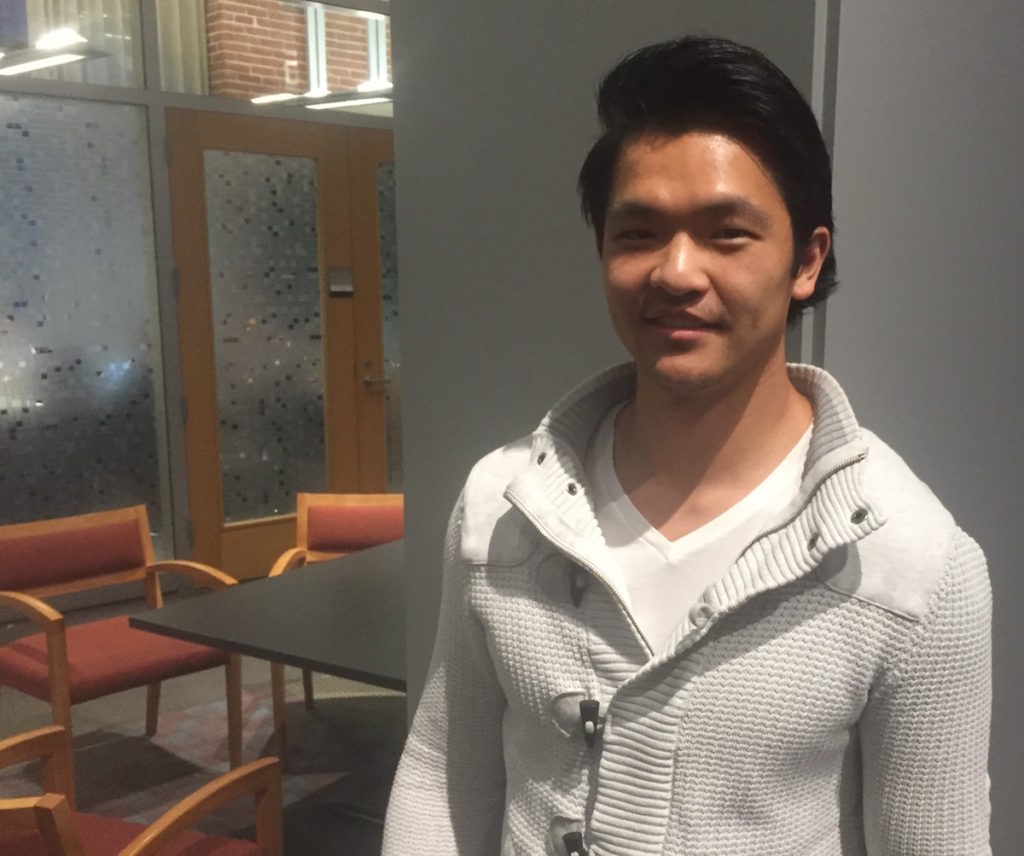 The next 12 months will likely determine whether Lucid VR is a hit or a bust. But the day I interviewed Han in San Francisco, Inc. Magazine had just spent three hours in a photo shoot with this under-30-year-old, and you could see and feel his confidence and charisma. “I’m not worried about anyone,” he said, flashing a smile. “I don’t compare myself to anyone else but myself.”
The next 12 months will likely determine whether Lucid VR is a hit or a bust. But the day I interviewed Han in San Francisco, Inc. Magazine had just spent three hours in a photo shoot with this under-30-year-old, and you could see and feel his confidence and charisma. “I’m not worried about anyone,” he said, flashing a smile. “I don’t compare myself to anyone else but myself.”
Han Jin wants to popularize a 3D camera that he hopes will allow people to step into each other’s shoes, and see beyond the limits of nationalities, culture and ethnicity. Han may have been born in China and schooled in Germany, but there’s no doubt that he was made in California, the latest model of the quintessential Silicon Valley entrepreneur.
跳伞进入虚拟现实:金汉雄(Han Jin)和Lucid Cam
集合了一个移民者的美国梦,一个电学工程师的大脑和一个充满了同感心的旅行者,你会得到什么?这是一篇关于在硅谷年轻人的初创梦。
好事好像一直与金汉雄反着来。他的父母在他还不会走路时就离婚了,必须开始新的生活。他的母亲Zhao必须离开她在北京才一岁的儿子和父母因为她在德国教授传统中医。金汉雄六岁才去汉堡与他母亲一起生活。这个独生子在一个没有多少亚洲人的城市中被身边“高高的金发的”德国人包围着。“我不会说德语,我也不认识任何人,”他回忆道“我必须适应。”
在卡尔斯鲁厄理工学院学习时,金汉雄在电子和机械工程上努力钻研。并且染上了“旅游热,”他在瑞典学习的一年中他先后探索了法国,比利时,捷克共和国,印度,还有他的祖国中国。UC伯克利的研究生似乎很遥远但是他申请了并且被录取了,随后金汉雄独自一人来到加州并且完成了学业从此“在这里开始了我的生活。”
当他获得了一家在硅谷的公司的项目经理的职位时他的生涯似乎已经稳定。这个工作并不有趣,但是“正是普通亚洲父母所期望的。”金汉雄把这个工作看作一种保障。“作为一位移民,这是一个巨大的困扰。你必须有人赞助你的H1B签证。”绿卡似乎更遥不可及。他被告知要获得绿卡需要十年。
在他工作的第一个月,金汉雄发现了如何改进传统的预测市场需求的方式,并且他开始自学编程。三个月之后他已经独自建立了一个市场需求预测模型比之前人工的方式更佳准确。但是金汉雄并没有被提拔,当他在感激这份在硅谷的工程师工作的同时,他开始意识到他的创业梦被满满的“冲刷掉”。
灵感来源于两个方面:有梦想的移民创业家,和斯坦福大学的博士有着一个诱人的样品。 在2014年四月,一个法国亚裔创业家Paul Duan叫金汉雄帮助一个致力于解决社会问题的数据科学初创公司的一个项目叫 Bayes Impact。“Paul当时只有18岁,他真的启发了我。他进入了Y Combinator,筹到了钱并且规模化了公司。” 金汉雄说“我就是最初的成员之一。”
向前跃进
受到了Duan影响,金汉雄尝到了创业的乐趣,在2015年二月金汉雄申请了令人垂涎的O-1签证。这种签证是政府批准给那些在“科学,艺术,教育,商业或者体育上有着出色才能的人”的签证。在他获得签证的后面那个月他发现了一些很酷的东西。就是Adam Rowell,一位非常出色的斯坦福电子工程博士展示给金汉雄一个可以使用并且有潜在用户的3D摄像机。旅行为金汉雄打开了新的视野,照相机给了他一个“融入不同国家“的机会和一路上接触到那些日子过的不好的人们时学到到感同身受和理解。机缘巧合下就在金汉雄获得O-1签证后,并且向公司辞了职。在2015年六月,他组建了Lucid VR—他自己作为CEO,Rowell作为首席技术官。就在做了这个决定不久他开始想自己是否做了一个错误的决定。
“不,我并没有仔细考虑过,”金汉雄说直接进入初创公司“这感觉就像跳伞没带降落伞。” 募集资金远比这个年轻的CEO想象的难。尽管Lucid VR最早收到了七万的天使投资,更大的投资也尚未实现。一线生机出现在当360硬件孵化器(Lab360 Hardware Incubator)提供给他们免费场地的时候。(这是一家在圣克拉克由中国资助的加速器,并且孵化了许多出色的公司比如 Arioliving。)在2015年秋季金汉雄资金短缺所以他们到Indiegogo上转动了众筹的巨轮。“前三天很慢,”金汉雄回忆道。他知道不好的项目一般也无法在Indiegogo上飞翔。“我为什么辞职?”金汉雄在思考。“我为什么要做这个?我放弃了一切。”
汉金雄告诉自己“现在是时候证明自己是个例外。”他们每天更改了他们Indiegogo主页许多次不断发现自己有没有问题。然后汉金雄更是做了一次飞跃性的尝试。他开车到Hollister爬上了一架小飞机飞到一万五千英尺然后跳伞。他把这个跳伞者用LucidCam摄像机并且用3D的方式记录自己跳伞过程的体验放到了他们Indiegogo的主页。这是我们在Indiegogo第十天。“我们转变了局势。”汉金雄说“我们在第二十五天就完成了我们十一万五千美金的目标。”几周以后汉金雄由做了一次大胆的尝试,独自飞到台湾。“天哪,这招竟然管用。”他回忆道在Indiegogo上的成功,“现在我们需要制造这些摄像机。”他就这么降落到台湾并且向岛上最大的五家制造商展示他的产品。Wistron签了协议并且同意投资一百万美金然后在三月末,Lucid VR宣布他总共从Wistron,S2 Capital,Lab360,TEEC Angel Fund和17 Miles Technology中总共获得了两百一十万投资
精益创业遇到3D摄像机
LucidCam stereoscopic 3D cameras(LucidCam的3D摄像机)在六月份已经准备好发货了,500个订单给Indiegogo的支持者们然后剩余的摄像机放到市场去卖,价格是499美元。金汉雄坚信他们可以开发出这个市场是通过精益创业方式让产品使用更简单,方便和便宜。
这个市场的标准360度全景而Lucid只有简略的180度角模式。“为什么360度的照相机没有被推广?”汉金雄问道于盲。“这让这个硬件的使用体验变的笨重和巨大。这很难规模化。文件的大小也会很大。”强调下载和处理360度照相机拍摄的文件是个麻烦,他还补充道“180度照相机,这个硬件会更小,更容易走规模。更方便携带。”
便携性是这个手持或身体相机的关键。这个32GB的容量可以拍摄长达十小时的高清4k品质内容。把你的手机放到LucidCam摄像机背后你就可以看见你所录的。文件会直接传到你的手机然后Adobe Creative Suite会帮你编辑。“我们希望保持简单,”汉金雄说,早期采用者们一般是导演编剧和内容制造者。然后“如果内容够好我们会吸引大众消费者。”
当然这个市场有许多大玩家。GoPro就是一个,他们也可以发布180度照相机用他们丰富的资源。但是汉金雄迷惑的说道“GoPro是一个硬件公司,我们的强项则是软件。为什么一个大公司会对这些这么小的利润感兴趣?”
接下来的12个月就会决定Lucid VR到底会是一个惊喜或者只是昙花一现。就在我采访汉金雄的当天在旧金山,Inc杂志刚刚花了三个小时给汉金雄拍摄了专辑,并且你可以感受到他的自信和魅力。“我并不担心任何人,”他说话是露出了微笑。“我从不与他人比较我只和我自己比较。”
汉金雄希望推广一款3D摄像头,希望能让人们走进彼此的鞋子,超越民族、文化和种族的界限。汉金雄出生在中国并在德国接受教育,但是不可争辩的是他也是“加州制造”,并且是标准的最新款的硅谷创业家。

